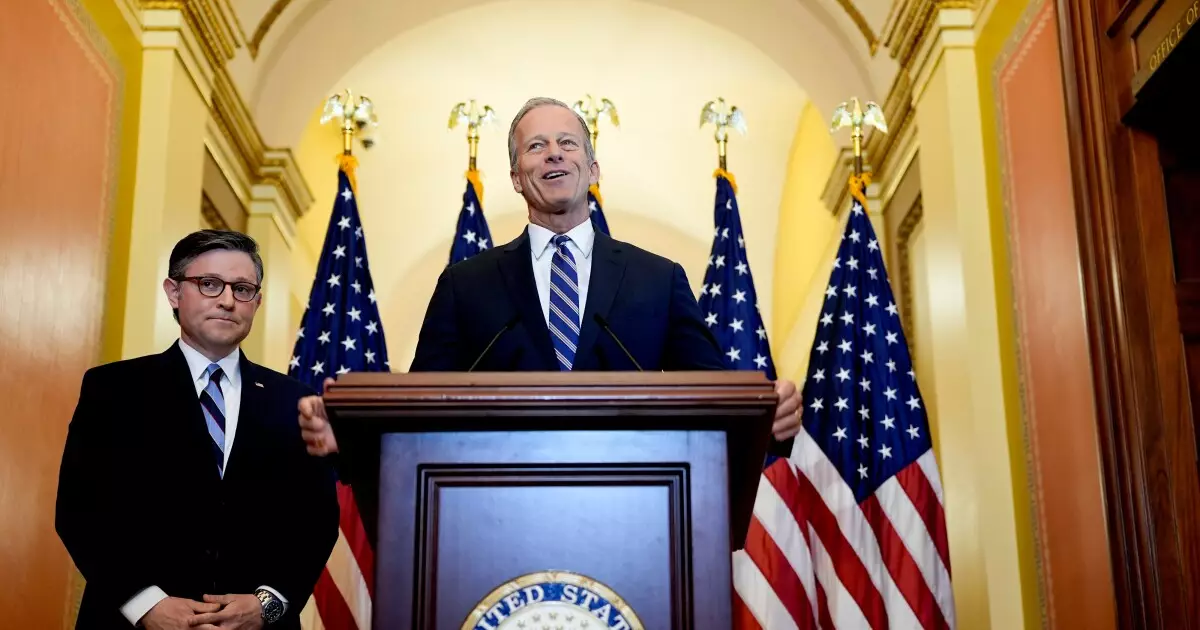The recent approval of President Donald Trump’s controversial “big beautiful bill” through the House of Representatives raises significant concerns about fiscal responsibility and governance. While Republican leaders tout the 216-214 vote as a victory, it marks a precarious step towards expansive legislation that some might argue jeopardizes sound economic practices. The passage comes in light of a deeply divided GOP, with Party stalwarts and belligerent conservatives struggling to reconcile their divergent priorities. This hardly signals a harmonious consensus but instead showcases a troubling inclination towards opportunistic legislation cloaked in the guise of reform.
The Fiscal Clock Ticks
This bill doesn’t merely extend the Tax Cuts and Jobs Act (TCJA) but does so under a disturbing $5 trillion price tag. At its core, lawmakers across the political spectrum recognize the shadow of looming debt. While proponents argue that tax cuts will stimulate economic growth, history has shown that the benefits of such measures are often overstated and inequitably distributed. The sweeping nature of the proposed budget cuts—upwards of $1.5 trillion—is alarming, as they may harm essential public services. The deeper these cuts go, the more likely Congress may consider reducing tax exemptions for municipal bonds as a revenue mechanism, a tactic that could undermine infrastructure and local governance.
Deceptive Promises of Efficiency
House Speaker Mike Johnson, together with Speaker Majority Leader John Thune, vigorously endorsed this legislation, promising enhanced government efficiency and effectiveness for the American people. However, those claims ring hollow among taxpaying citizens weary of rampant governmental inefficiency. Instead of mere trimming around the edges, what the country truly needs is a fundamental re-evaluation of how public funds are allocated, and a program of genuine reform that doesn’t simply perpetuate a vicious cycle of short-term gains followed by long-term losses. The rhetoric suggests a commitment to making government leaner, but without a concrete plan for transparency and accountability, the gamble seems reckless.
Bipartisan Dissonance
Dissent within the ranks of Republicans, particularly from Representatives Thomas Massie and Victoria Spartz, underscores the disjointed nature of this legislative push. Their concerns are rooted in a valid narrative—that this budget resolution sets the stage for unprecedented deficit increases, thus contradicting the party’s long-standing mantra of fiscal conservatism. Massie’s and Spartz’s warnings that altering accounting rules could create a “Pandora’s box” of unforeseen consequences cannot simply be dismissed. The growing disillusionment among a segment of the GOP reveals an internal struggle that threatens unity just when moral governance and fiscal responsibility are needed most.
The Impending Reckoning
In the Senate, the echoes of skepticism resonate even more strongly, as the plan intricately ties tax cuts to yet another series of questionable offsets based on the so-called current policy baseline. This accounting methods graph is deeply contentious; it not only dances around the fundamental issues surrounding deficits but risks normalizing the idea of fiscal irresponsibility. The Republican establishment appears increasingly willing to navigate this ethical quagmire—cunningly using outdated models to circumvent genuine accountability and reveal the underlying fragility of economic assumptions.
Looking Beyond Economic Gain
As the American populace grapples with ambitious promises of economic prosperity led by tax cuts, it is essential to cut through the noise. The reality is that without a conscientious deliberation on the economic and social implications of such sweeping changes, lawmakers may very well undermine the very fabric of American governance. The challenge is not merely one of fiscal policy; it’s a matter of preserving trust in government, protecting public interest, and ensuring that those most in need are not left behind amid the grand promises of a “big beautiful bill.”
In sum, this moment serves as a clarion call for the need to confront the implications of our legislative decisions squarely, rather than through selective optimism that diminishes the complexity of our fiscal challenges. If we’re to build an enduring foundation for prosperity, it must be constructed with integrity, transparency, and genuine care for every citizen’s well-being.

